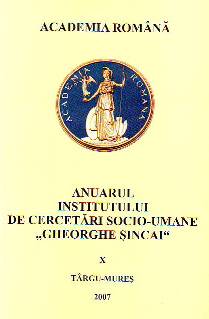Intoleranţă religioasă sau convieţuire în societatea moldovenească pre-modernă: realităţi sociale reflectate în relatările misionarilor catolici din p
Religious intolerance or cohabitation in pre-modern Moldavian society: social realities reflected in the catholic missionaries’ relations during the f
Author(s): Carmen Maria DorlanSubject(s): History
Published by: Institutul de Cercetări Socio-Umane Gheorghe Şincai al Academiei Române
Keywords: religious intolerance; cohabitation; pre-modern Moldavian society; 17th century; Congregatia de Propaganda Fide; Romanian historiography
Summary/Abstract: The present article intends to analyze the discourse related to the practice of religious intolerance or peaceful cohabitation in pre-modern Moldavian society as reflected in the Catholic missionaries’ relations sent to Rome, during the first half of the 17th century, mainly to Congregatia de Propaganda Fide after 1622. Based on edited documentary sources in Romanian historiography the image reflected is focused mainly on two components: on the one side, the information related to collective attitudes performed toward the religious Catholic minority and other forms of religious identity resulted from the impact of Reformation, which communicates not only the prospect of religious toleration within the whole Moldavian society, but also stresses on moments of common intensive religiosity viewed either during the participation to pilgrimages, miracles or common reactions to scandals or other manifestations of immorality considered as deviations from the Christian generally accepted way of life. On the other side, the image carefully constructed and transmitted to the Roman authorities not only responds to the tridentin missionary strategies and principles concerning the Catholic renewal in this part of the European continent, but also insists on the importance of the princes’ politics toward the local Catholic minorities but mainly toward them, meaning the authors of this kind of discourse. As a whole, the discourse reflected through these relations expresses an important effort made in order to communicate information related to the societies they interact to and also to lay the foundations for future politics whose importance and implications are far greater if we think to the impact and evolution to the process of acculturation developed here and which is also visible if we consider the ever growing interest of the missionaries in transmitting a more accurate image on the Moldavian orthodox society. The resulting image appears to impose the necessity to re-evaluate concepts like religious toleration or cohabitation in order to better understand the interactions performed within a certain society.
Journal: Anuarul Institutului de Cercetări Socio-Umane »Gheorghe Şincai« al Academiei Române
- Issue Year: 2007
- Issue No: 10
- Page Range: 222-234
- Page Count: 13
- Language: Romanian

